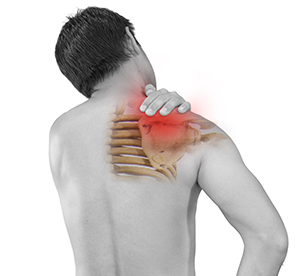

Frozen Shoulder, scientifically known as Adhesive Capsulitis, is a condition that affects the shoulder joint, causing pain, stiffness, and limited mobility. It typically develops gradually over time and can significantly limit the range of motion and mobility of the affected shoulder.It is estimated that around 2-5% of the general population may develop frozen shoulder at some point in their lives. The condition most commonly affects individuals between the ages of 40 and 60, with women being more susceptible than men.
Frozen shoulder is believed to be a result of the thickening and tightening of the joint capsule surrounding the shoulder joint. This can lead to the formation of adhesions, or abnormal bands of tissue, which restrict the movement of the shoulder joint. Frozen shoulder typically progresses through three stages: The Freezing Stage, The Frozen Stage, and The Thawing Stage. During the freezing stage, pain and stiffness gradually increase, making movements of the shoulder joint more challenging. The frozen stage is characterized by a plateau phase where the pain may subside but the stiffness and limited range of motion persist. Finally, during the thawing stage, there is a gradual improvement in shoulder mobility, although it may take several months to years for a full recovery.
Understanding the facts about frozen shoulder can help individuals recognize the symptoms, seek appropriate treatment, and actively participate in their recovery process.
Symptoms of frozen shoulder typically develop gradually and progress through different stages. The hallmark symptom is shoulder pain that worsens over time and limits the range of motion. Here are the common symptoms associated with frozen shoulder:
The symptoms of frozen shoulder can vary in severity and duration. The condition typically progresses through three stages: the freezing stage, the frozen stage, and the thawing stage. Each stage is characterized by different symptoms and levels of shoulder dysfunction.
The exact cause of frozen shoulder is still not fully understood. However, several factors are believed to contribute to the development of this condition. Here are some common causes and risk factors associated with frozen shoulder:
While these factors are associated with an increased risk of developing frozen shoulder, the exact cause can vary from person to person. Consulting with a healthcare professional is essential for an accurate diagnosis and to determine the underlying cause of frozen shoulder in individual cases.
If you are experiencing symptoms of frozen shoulder or have concerns about your shoulder mobility, it is important to seek medical attention for a proper diagnosis and treatment plan. A healthcare professional can assess your condition, conduct any necessary imaging or tests, and recommend appropriate interventions to help alleviate your symptoms and restore normal shoulder function. Remember, early intervention and proper management are key to improving your quality of life and preventing further complications. Contact a healthcare provider at MASSH today to discuss your concerns and take the necessary steps towards relief from frozen shoulder.
Embark on a journey of exceptional healthcare guided by industry's true luminaries who consistently exceed
expectations and set new benchmarks for excellence in everything from cutting-edge innovations to personalized care.
MASSH Group of Hospitals is a trusted name in delivering advanced healthcare solutions with a network of premier super speciality hospitals, committed to providing ethical, compassionate, and innovative care. Our expanding network ensures that cutting-edge medical services are always within your reach.